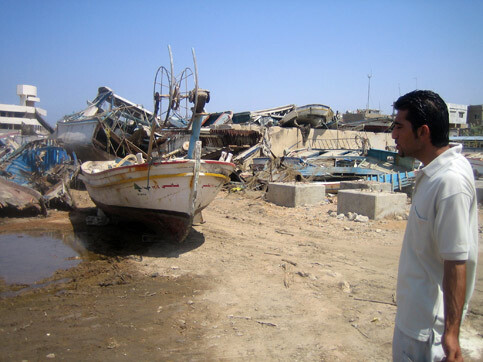IRIN 12 September 2006

Fisherman Hussein Hjeil points out that the majority of fishing boats were destroyed by Israel’s bombing. (Serene Assir/IRIN)
BEIRUT - For the past five days, since Israel lifted its nearly two-month-old naval and air blockade on Lebanon, Beirut’s residents have been anxious to see signs that the country’s deteriorating economy is recovering.
However, given the plethora of problems the 34-day war in July and August brought, the mood in Lebanon’s capital is a mix of hope and indifference.
“No doubt, the fact that the blockade has been lifted is a good thing,” said taxi driver Fadi Saab. “But I think it will take some time before things will actually improve, because the effects of the war were so overreaching.”
From the start of the conflict between Israel and Hezbollah on 12 July until 7 September - 24 days after a United Nations-brokered ceasefire - the movement of people and goods into and out of Lebanon had been greatly curtailed by Israel’s blockade.
Its land blockade, however, was lifted on 14 August, the day that hostilities ended, enabling the movement of goods by land into Lebanon via Syria.
Now, with ships and aircraft able to move without Israeli permission, a pervading tension that had existed among the Lebanese is beginning to ease.
“Until now, no one was sure if the continued blockade meant that there was going to be another war,” said shopkeeper Fouad Hallaq. “Now we are much more relaxed, and the goods that were missing from our shelves since 12 July have started to come in as normal.”
Nevertheless, it will take longer for the full effects of the blockade lifting to be felt. Saab, the taxi driver, said that while petrol costs him less now - US $16 to fill up rather than US $20 - the price of other products, such as rice, remains high.
Samir Makdisi, a professor of economics at the American University of Beirut, said that the economic impact of Israel’s military offensive was the primary cause of concern for recovery.
“The impact of the blockade needs to be understood within the context of the overall impact of the war,” Makdisi said. “Essentially, it constituted the continued loss of income.”
Before the war, the growth rate for the Lebanese economy for 2006 was projected at three percent. Now, it is expected to be negative.
However, the Lebanese are confident that, with the blockade lifted, the recovery effort can be accelerated.
“The Lebanese economy has proven itself time and again to be uniquely resilient,” said Makdisi. “Even during the civil war [1975-1990], businessmen worked vigorously.”
For some business owners, the effects of the lifting of the blockade have been tangible. Zahi Kanj’s pharmacy is in Shiah, one of the areas of southern Beirut that was targeted by Israeli bombing. He continued to work throughout the war and ensuing blockade, despite shortages.
“Now that the blockade has been lifted, we are no longer experiencing shortages, except routine shortages which we always faced on certain products,” Kanj said.
Similarly, things are getting back to normal at the American University Hospital, which was under threat of closure owing to fuel shortages during the war.
“We definitely feel a sense of normalcy now,” said hospital director Munthir Uzayye.
However, for those whose work and income were directly affected by war damage, little has changed. “I come here [to the port] in the vague hope that I will receive the compensation we fishermen were promised for the destruction of our boats,” said Hassan Hjeil, a fisherman who used to work from the Beirut port of Al-Uzai, which was bombed.
“All we need is compensation to buy new boats. So far, all we have received is US $150, ever since the war started. For us, the lifting of the blockade has brought no comfort,” Hjeil said.
Both the government and Hezbollah, the political party whose armed wing was fighting Israel, have promised compensation to those who lost property or their source of income during the war.
Those whose homes were destroyed have, to a great extent, been compensated by Hezbollah, but efforts towards the overall economic recovery have yet to be made.
“The government and Hezbollah know about our plight,” said fisherman Mohamed Faqih. “But we have yet to hear back from them. All we can do is wait.”
This item comes to you via IRIN, a UN humanitarian news and information service, but may not necessarily reflect the views of the United Nations or its agencies. All IRIN material may be reposted or reprinted free-of-charge; refer to the copyright page for conditions of use. IRIN is a project of the UN Office for the Coordination of Humanitarian Affairs.
Related Links